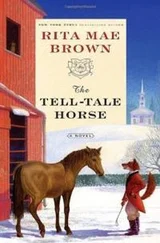“Do people use thallium chloride to kill themselves?”
“There are other ways to do that with substances more easily acquired, but I’m sure it’s been done somewhere by someone.” Cooper shrugged.
“I liked her. We all liked her. We weren’t close, but when we were kids it was a small community.” Harry crossed her arms over her chest for a moment.
“Turn on the TV, will you?” Cooper said.
“Sure.” Harry picked up the remote from the kitchen counter, turning on the large-screen TV affixed to a wall.
The cats and dog, asleep in their fleece-lined beds, paid it no mind. They were accustomed to Harry checking The Weather Channel frequently.
Harry flipped through until she came to the local news, which is what Cooper wanted to see. A remarkably clear picture of Edward Cunningham with local reporter Bill Coates appeared. Former governor Sam Holloway’s grandson was being interviewed regarding his Senate campaign.
“You don’t think there’s a war on women?” the reporter asked.
“That’s a Republican problem, not mine,” said Eddie.
“Mr. Cunningham, you are perceived as an old-time Democrat by many, which is really a new-time Republican. Two bills are before the state Senate, one on removing special requirements from clinics that perform abortions, costly requirements put in place by our previous Republican-controlled legislature, and another bill purported to close the pay gap between men and women for equal work. What is your position on both?”
“Well, Bill, I learned from my grandfather. He was criticized by the head of the Democratic Party in Virginia in the late sixties before being elected governor. My grandmother, a nurse, continued working throughout Granddad’s career. The party fellow said, ‘Sam, can’t you keep that woman in line?’ And Granddad quipped, ‘No. That’s why I married her.’ That ought to tell you how I feel about women.”
“Slick.” Harry’s eyebrows rose.
“Didn’t answer the question,” Cooper replied.
“Do they ever?”
The two watched the rest of the news. No mention of Barbara Leader.
“You don’t have to report that the accident is now regarded as a suspected murder?” Harry questioned the deputy.
“Do. But Rick and I will wait until we have the final medical examiner’s report. Gives us a little more time.”
Clicking off the TV, Harry sat at the kitchen table. “Are you sick of this women stuff? I don’t want to hear Eddie Cunningham’s opinion on women.”
“Bored and insulted.” Cooper sat across from Harry. “If anything is brought up as a woman’s issue, it means whoever is bringing it up sees women as second-class citizens. Plus, they’re assuming we all think alike. That’s the ultimate insult.”
“Well, we’re unequal on the money front, but I take your point. The media and politicians think we care only about so-called ‘women’s issues,’ and in Eddie’s case, vote for or against.”
“What it really means, Harry, is there’s money and political gain to be had focusing on women as separate from men. There’s Eddie, pulling an old-boy routine, using his grandfather and grandmother, and I pretty well think he has no concern about equal pay for equal work or any of it.”
“ Mmm, seems to be the case. I mean, other than trotting out Chris and the two kids, he steers clear of anything that could be construed as human rights. Ranting against welfare, immigration, on and on. Makes me suspicious, but I’d be even more suspicious if he wasn’t working to promote business, create jobs. At least that’s in his campaign. Anyway, it is boring, but Barbara Leader’s mysterious death is not.”
“No.”
“So back to that. If someone killed her, they would have had to have some medical knowledge. Had to know where to get the stuff.”
“We’ve been checking hospital records, doctors with whom she had a working relationship. I’ve been on it. So far nothing.”
“It’s like finding a needle in a haystack, isn’t it?” Harry commiserated.
“It is, and I always hope I don’t sit on the needle,” Cooper said.


Monday, September 13, 1784
Peter Studebaker, a wagonmaker from Huntington Township, York County, Pennsylvania, sat in an empty classroom with Captain Bartholomew Graves, lately of the Royal Irish Artillery. He had come to deliver a letter given to him from Charles West, as well as to talk a little business.
Schoolteacher Bartholomew smiled at Peter, a man of middling years like himself. “Your business flourishes,” he complimented his visitor.
“Which is why I’ve come to you. As an artillery officer, you must be good at math.” He chuckled. “Your students I’m sure profit from this.”
“Ah, Mr. Studebaker, if only I could get them to sit still.”
Both men laughed at this, and Peter glanced at the floor, then up at the rugged veteran of the British Army. “You had to carry cannon over rough ground and at times at high speed. What I am interested in, sir, is the manner of axle. My son and I mean to make the strongest wagons in Pennsylvania. Axles.”
“Always the weak spot and the rougher the ground, the more damage,” said Bartholomew. “A wheel can fly off. That can be replaced or mended, but when an axle breaks, without proper tools and a forge, that’s the end of it.”
“I have heard of your success on the battlefield.”
“You flatter me. If I’d been successful, I’d not have been captured at Saratoga.”
Peter slapped his thigh. “Ha. Ah, but then war must be such confusion, smoke, noise, if a man can’t hear the trumpeter or see. To simply live is a victory. But I know you were not here at Camp Security.”
“No. I was down at The Barracks outside of Charlottesville. Hearing piecemeal reports of the southern campaign, I felt the Crown would lose this war, and I tell you, sir, even if it sounds treasonous, I began to see that you should win.”
“Indeed.” Peter nodded.
Bartholomew held out his hands expansively. “I determined to live in a new land, a free land and one where my lowly birth would not impede my progress.”
“But you, sir, attained the rank of captain.” Peter knew some of Bartholomew’s past. The Irishman was well liked; his friends often told some of his tales.
Bartholomew leaned forward, his chair creaking a bit. “I had outlived my senior officers, all of them having purchased their commissions. Not a brain in their heads. And then I secured some promotions through combat. Ah, Peter, war is a terrible thing, but we always make advances. And so the next war will be even more terrible than the one that preceded it.”
Wryly, Peter replied, “I hope, sir, some of those advances involved axles.”
Now it was Bartholomew’s turn to slap his thigh and laugh. “What would you have me do?”
“Come to my shop. Look at the axles and the wheels of each of my wagons. I will pay you.”
“We can talk about money later, Peter. I will ride over this Saturday.”
Peter changed the subject. “Do you like teaching? I wonder, it must seem dull?”
“Ah.” Bartholomew grinned. “The boys at York County Academy are not dull—wild, perhaps, not quite what the Episcopal Church had in mind—but I have an affection for them. Perhaps I recall my own misdeeds when I encounter theirs.”
Peter nodded. “Yes. It goes so fast, does it not? Time?”
The former captain shook his head. “Sometimes in my sleep I can hear my mother’s voice.” He waved his hand. “So long ago, but Peter, we are here and we must make the most of it.”
Читать дальше














